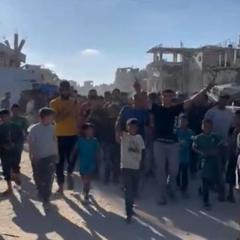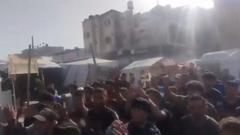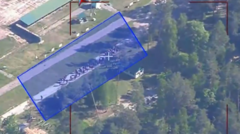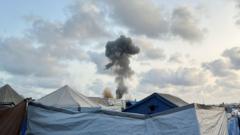Putin's first visit to Kursk since Ukrainian advances highlights both shifting military dynamics and potential openings for peace talks.
Putin’s Visit to Kursk: A Symbol of Control Amid Ongoing Conflict

Putin’s Visit to Kursk: A Symbol of Control Amid Ongoing Conflict
Russian President's trip to the Kursk region reflects a strengthened position following recent military successes.
President Vladimir Putin of Russia made a significant appearance in the Kursk region on Tuesday, marking his first visit since Russian troops regained much of the territory lost to Ukrainian forces during an unexpected offensive last year. The Kremlin announced that his tour included a stop at a nuclear power plant under construction, a meeting with local officials, and discussions with volunteers assisting civilians affected by the ongoing conflict. The visuals of his engagement aimed to convey a sense of normalcy, despite continued skirmishes in the area.
This visit comes on the heels of the first direct peace negotiations between Russia and Ukraine in over three years, hinting at a new chapter in their fraught relations. Until now, President Putin had made it clear that he would not enter negotiations until Ukraine's forces surrendered in Kursk, while Ukraine had hoped to leverage its territorial gains for a more favorable peace settlement. Analysts suggest that Putin's visit may indicate he perceives a pivotal shift, perhaps viewing certain negotiations as feasible, even as Ukraine persists in executing targeted operations across the Russian border.
In August, Ukrainian forces successfully invaded Kursk, claiming an impressive 500 square miles of territory, but their momentum slowed due to mounting resistance from Russian troops, which were bolstered by North Korean military support. A notable counteroffensive by Russian forces in March had since reclaimed most of the lost ground. Currently, Ukrainian forces reportedly hold a small segment of Russian territory and are continuing to test Russian defenses along other border areas, emphasizing the ongoing tension and uncertainty in this volatile region.
This visit comes on the heels of the first direct peace negotiations between Russia and Ukraine in over three years, hinting at a new chapter in their fraught relations. Until now, President Putin had made it clear that he would not enter negotiations until Ukraine's forces surrendered in Kursk, while Ukraine had hoped to leverage its territorial gains for a more favorable peace settlement. Analysts suggest that Putin's visit may indicate he perceives a pivotal shift, perhaps viewing certain negotiations as feasible, even as Ukraine persists in executing targeted operations across the Russian border.
In August, Ukrainian forces successfully invaded Kursk, claiming an impressive 500 square miles of territory, but their momentum slowed due to mounting resistance from Russian troops, which were bolstered by North Korean military support. A notable counteroffensive by Russian forces in March had since reclaimed most of the lost ground. Currently, Ukrainian forces reportedly hold a small segment of Russian territory and are continuing to test Russian defenses along other border areas, emphasizing the ongoing tension and uncertainty in this volatile region.

















